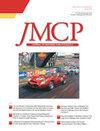Bargaining Between Community Pharmacies and Third-Party Payors: Influences on Bargaining Outcomes
引用次数: 0
Abstract
OBJECTIVES: To address the gaps in knowledge of pharmacies' evaluation of third-party contracts and the bargaining process between community pharmacies and third parties by: (1) assessing what activities pharmacies regularly perform in evaluating and signing a third-party contract; (2) determining which bargaining activities are occurring between pharmacies and third-party payors; and (3) evaluating the associations among the characteristics of the bargaining parties, the bargaining process, and bargaining outcomes with community pharmacies and third-party payors. DESIGN: Mail survey. PARTICIPANTS: A random sample of 900 independent and small-chain pharmacies. RESULTS: Ofthe 863 delivered surveys, 308 (35.7%) were returned and analyzed. Respondents did not report a high level of formal contract evaluation. They reported, on average, that they rarely requested a change in a contract. This was consistent with the finding that third parties usually refuse to negotiate changes in a contract. The respondents reported that sometimes they did not sign a contract because of unacceptable terms. Multiple regres~ sions for two bargaining outcomesequity of contractual terms and satisfaction with a third party payor-were significant. The same bargainer and bargaining process variables were used as the independent variables in the regressions. For equity of contractual terms (R Square=0.442), significant associations were found for contending, problem solving, and dependence symmetry. For satisfaction with a third-party payor (R Square=OA29), significant associations were found for collaborative communication, contending, and dependence symmetry. CONCLUSIONS: Pharmacies should develop strategies to improve communication with third parties. The symmetry of dependence between a pharmacy and a third-party payor is a key influence on bargaining outcomes. The strategies employed during bargaining, such as contending or problem solving, also affect bargaining outcomes.社区药房与第三方付款人议价:对议价结果的影响
目的:通过以下方式解决药房对第三方合同的评估以及社区药房与第三方讨价还价过程中的知识空白:(1)评估药房在评估和签署第三方合同方面的常规活动;(2)确定药店与第三方付款人之间发生了哪些议价活动;(3)评估议价方特征、议价过程以及与社区药房和第三方支付方议价结果之间的关联。设计:邮件调查。参与者:随机抽样900家独立和小型连锁药店。结果:863份问卷中,308份(35.7%)被回收分析。受访者没有报告高水平的正式合同评估。他们报告说,平均而言,他们很少要求更改合同。这与第三方通常拒绝就合同变更进行谈判的发现是一致的。受访者报告说,有时他们没有签署合同,因为不可接受的条款。两种议价结果(合同条款的公平性和对第三方付款人的满意度)的多重回归是显著的。同样的议价者和议价过程变量被用作回归中的自变量。对于合同条款的公平性(R平方=0.442),在竞争、问题解决和依赖对称性方面发现了显著的关联。对于第三方付款人的满意度(R方=OA29),在协作沟通、竞争和依赖对称性方面发现了显著的关联。结论:药店应制定策略,加强与第三方的沟通。药店和第三方付款人之间依赖的对称性是影响议价结果的关键因素。讨价还价时采用的策略,如争辩或解决问题,也会影响讨价还价的结果。
本文章由计算机程序翻译,如有差异,请以英文原文为准。
求助全文
约1分钟内获得全文
求助全文

 求助内容:
求助内容: 应助结果提醒方式:
应助结果提醒方式:


